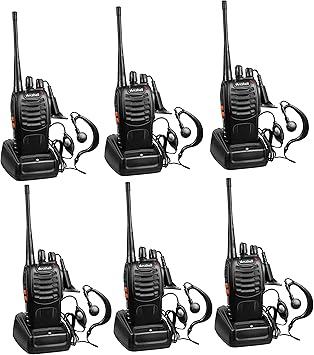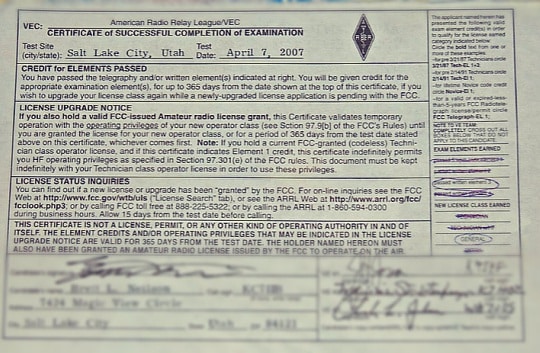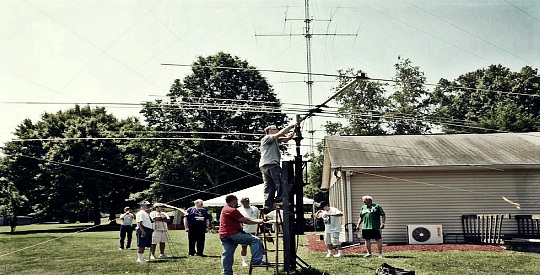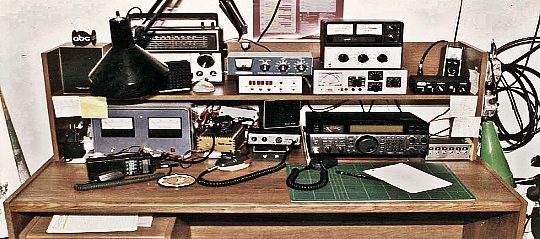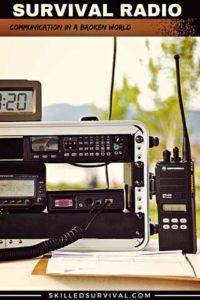
Today, we’re diving into the confusing world of survival radios. Because let’s be real—there’s a whole lot of static (pun intended) when it comes to choosing the right one.
- Which type is “best”?
- Should I get a license?
- Is my cell phone good enough?
- What about hand-crank radios?
Don’t worry, we’re cutting through the noise to give you the facts, not the hype:
Best Survival Radio On The Market
Anyone preparing for a large-scale emergency should own a Ham radio. Here’s our favorite handheld Ham radio at a fair price:
A high-quality portable unit like the BaoFeng BF-F8HP can come in various sizes, but it should be small enough to operate on a battery and fit in one’s bug out bag.
It has a long range for a handheld radio and has a 30% larger battery, which equals a very long battery life.
Average Battery Life:
UV-5R High (4W): 18 Hours.
BF-F8HP High (8W): 20 Hours.
BF-F8HP Mid (5W): 24 Hours.
Communicating on the go or in your vehicle is a tremendous survival advantage.
For example, a hurricane will require a mass evacuation of a region’s population, and you won't be able to rely on your usual studio setup.
Instead, you'll want a radio you can take on the go.
An easy upgrade to your portable unit is a better antenna.
Swap the default antenna out with this one to transmit and receive at further distances.
Also, consider getting a radio chest harness to wear your communications while moving.
This will allow you to move tactically while still being able to communicate.
And adding a programming cable is highly recommended for easier PC programming.
Make sure to check out this detailed review video of the BaoFeng BF-F8HP as well:
↓ Baofeng Radio Review by TheUrbanPrepper
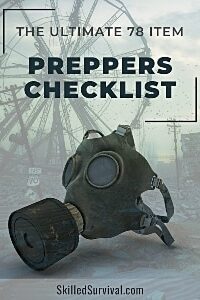
Want a free 78 item preppers checklist?
Enter your email below to instantly download this Complete Checklist PDF. No purchase necessary. 👇 👇Ok, maybe at this point, you’re a bit overwhelmed and intimidated by amateur radio. I get it; it can be complex, and the equipment can be costly.
So you might wonder,
“Is there an option for those who don’t want to go down the ham radio rabbit hole?”
Yes, there are a few more survival radio alternatives as well:
Everyone knows about walkie-talkies. Many of us used them as kids to communicate with friends or family at short distances.
They're also used throughout the US in manufacturing and construction crews. They're perfect for communication between departments and operators.
So if you're interested in local survival communications, invest in a high-quality set of walkie-talkies.
If you're interested in loca2-way communication but would prefer to still use your cellphone then you should check out this new gadget - The goTenna.
The goTenna allows for local encrypted cell phone communication while bypassing the need for cell towers.
It's like carrying around your own mini personalized cell phone tower.
Make sure to get two because both people need one in order to communicate via cell.
Another option is to get a hand crank radio. It’s a resilient device to listen to local radio stations.
The biggest downside here is it’s a “listen-only” device. There’s no 2-way communication; you’re just tuning in to what’s going out from emergency broadcasts.
Kaito has been making quality radios since 1998.
The Kaito KA500 Voyager is an excellent choice for your hand crank emergency radio.
It has multiple charging methods, such as the hand-crank, USB port (for USB charging), and solar chargers; the KA500 can also use standard AA batteries. And the AA battery is practically a worldwide standard.
It features AM/FM, weather and shortwave frequencies, and Alert mode. It also has LED flashlight modes, which provide extra signaling options.
And the best feature is the number of unique charging options. This makes it one of the most resilient survival radio options.
That's why I consider it one of the best emergency radios ever.
Side Note: I hate dealing with aaa battery options and tend to avoid them.
If you want to see just what a hand crank radio can do, watch this review video:
↓ Hand Crank Radio Review – Eton Microlink
Never Trust A Cell Signal
What’s the first thing most people reach for in an emergency in modern society?
- Their bug-out bag? No way (remember, I said “most people,” not those of us who are prepared).
- A survival knife? Unfortunately no.
- Their survival radio? Probably not.
Most people use cell phones because it’s our society’s fastest way to call for help. And that makes perfect sense since nearly 95% of all US adults own a cell phone. And there’s no shame in utilizing this technology.
IF a cell phone network is operational, by all means, dial away. However, most people don’t realize their cell phone is an extremely fragile emergency communication device.
Even with a cell signal booster, you should not rely solely on a cell network as your only means of communication.
Cell phones are great for small emergencies (such as fender-benders or house fires). But they cannot be trusted for widespread disasters.
For example:
70% of the cell towers were out of operation for multiple days during Hurricane Katrina.
Just minutes after the Boston Marathon bombings, cell phone networks became overloaded, and all volume was blocked.
Cell phone networks jam when thousands of people begin dialing for help simultaneously. They’re not designed for that level of call volume. All cell phone networks are limited by a design capacity – similar to how a design capacity limits highways.
Once traffic hits a certain level, you get a standstill.
Large-scale emergency events take the cell networks well past these capacities in seconds.
Once a cell network jams, no one can get through.
Survival Radio Disaster Examples…
The Boston Marathon attendees were calling for help or calling their families to let them know they were alright. Plus, everyone outside of Boston who heard about the event was trying to call to see if their loved ones were safe.
Hence, no one could call in, and no one could call out – cell network gridlock.
This phenomenon was summed up perfectly by The Fast Company.
Mobile networks have bandwidth that is more than sufficient 99% of the time. However, when disaster strikes, the decentralized nature of the network means that whole geographic regions can be knocked out by increased call volume.
It’s not just cell tower jam-ups that make cell phone communication unreliable in emergencies.
During Hurricane Sandy, the cables between towers were damaged due to high winds and flooding. Again, cell phone communication was severely restricted when people needed to contact each other most.
Imagine a large-scale national disaster involving the entire nation, such as a nuclear attack or EMP strike. You pull out your cell phone to get help, quickly discovering you’re holding an expensive paperweight.
Cell phones should never be your only means of survival communication.
The bottom line is:
The cell phone is a low-reliability survival communication device. You need to invest in a survival radio.
What About Cell Network Backup Systems?
Ok, maybe you are still not convinced.
We have smart people building these cell phone networks, and they’ve put in place backup systems, right?
Yes, but cell phone networks will eventually cease functioning in a long-term electrical outage. Most cell towers do have a backup battery system in place.
These battery/generator systems keep them functional for short-term power outages. Cell towers use AC power to function, so if the grid goes black and the backup generators aren’t refueled, they eventually stop working.
Basically, for any long-term power outage, cell networks may become entirely useless.

Want a free 78 item preppers checklist?
Enter your email below to instantly download this Complete Checklist PDF. No purchase necessary. 👇 👇Best Survival Radio Option – Amateur Radio
Now that you understand what’s not an acceptable survival communication option (cell phone) – the obvious next question should be, “What is?”
I’ll cover what I consider the best option for a prepper radio. Then follow that up with some runner-up options as well.
Amateur (Ham) Radio
Once you understand the importance of communication during a crisis, you also realize that there are only a handful of possible long-term survival communication methods.
I consider a ham survival radio the best. Ham radios will become the only long-range communication network in a broken world.
Why? Because they have the longest communication range and the lowest dependency on grid power. Yes, the radios themselves need power. But as an emergency communication device, many ham operators plan ahead.
Many have invested in personal backup systems like solar panels and generators. So when the cell networks are down, and grid power is down, I guarantee you a dedicated group of ham radio operators will still be chatting away.
During Hurricane Katrina, when cell networks were down and power was out, amateur radio operators stepped in to relay emergency communications.
So locally and regionally, ham radio operators will be in touch and talking even in a worst-case disaster. However, you’ll need repeaters to boost the signal for long-distance communication. And repeaters need power as well.
However, those in charge of these repeaters understand their crucial role in emergency communications.
Many have planned elaborate secondary sources of energy in preparation for worst-case scenarios. So, ham radio systems are our best chance at communicating when the grid power goes down permanently.
If you want a basic understanding of how ham radio works, watch this excellent video by TinHatRanch:
↓ HAM Radio Basics – HAM 101
Another reason to get a ham radio is to tap into remote and mobile internet access. It takes specialized gear and knowledge to set this up, but it’s a nice bonus that comes with getting a ham radio.
↓ Surf Web On DStar HAM Radio
Practice Going Off-Grid
Learning to operate an amateur radio is useless during an emergency if you don’t practice. And not just any practice; you need to replicate real-world situations.
Consider a few hypothetical situations and try to recreate these scenarios in practice sessions.
- You lose power; do your backup off-grid systems work?
- If you have something like a Power Station, do you know how to use it to power your radio systems?
- You only have two minutes to pack up and go. Are you ready to move quickly and take your radio equipment?
These are the types of situations you should practice.
To Get Your Amateur Radio License Or Not…
Ultimately, I will argue in favor of getting your license. But I will share the counter-argument first.
The Counter Argument
The argument against getting a license is in real survival situations, permits won’t matter. Permits are only valid and necessary in calm, civil times.
When SHTF licenses are silly, unenforceable gimmicks and a waste of the paper they are written on. I buy that argument 100%. The other issue with licensing is privacy.
You must provide your name, address, and other personal information to get licensed. Some people (especially those preparing) don’t want to provide these details. They prefer to keep their personal information private.
Argument For Licensing
However, I believe operating a ham radio with proficiency is a skill you must practice. It’s nothing like using a cell phone. It’s more like learning how to ride a bike.
It takes practice to get good at it.
Repetition is the only way to confidently communicate at long ranges using a ham radio. This means you should get your license asap so you can begin practicing.
The best ham radio operators have years of experience and reliable gear. Some can communicate around the world.
To join this club, you must properly power your ham radio and purchase large antennas (for longer communication potential).
Ham radios operate over radio frequencies, and it takes some practice to perfect this skill. You shouldn’t wait; it’s time you got your license.
How To Get Your Ham Radio License
All “official” ham radio operators require a license, including everyone inside and outside the United States.There are three basic levels of licenses available:
- Technician License
- General License
- Extra License
Technician License
The Technician License is an entry-level license. It’s the easiest to obtain and provides the legal right to communicate on local frequencies.
This license is relatively easy to achieve, especially since it no longer requires proficiency in Morse Code. It consists of passing a 35-question exam.
Pick up this study manual, read it thoroughly, take notes, and schedule an exam. And just like that, you’re now an official ham survival radio technician. Congrats!
You’ll be official if you’re licensed as a ham radio operator. This will help you gain respect and acceptance among other qualified ham radio operators.
I’ve heard stories about ham radio operators who will not speak with fly-by-night operators unless they have their licenses.
I’m sure exceptions would be made in a real emergency, but again, this friction makes practicing more challenging.
General License
Once you have your technician’s license, the next step is to get your General License. Having this license expands your transmission ranges.
Your restriction to local frequencies disappears, and you can now transmit as far as your equipment allows.
Extra License
Finally, you must pass a thorough 50-question exam to obtain an Amateur License. This license grants all U.S. Amateur radio privileges for all frequencies via all modes.
I often get asked if I can bypass the first two levels and focus on getting my Amateur’s License. The answer is No.
You must achieve all previous levels of licenses to obtain the next level—no skipping allowed.
You must obtain your Technician’s License before getting your General License, and you must pass both the Technicians exam and General Exam to get your Amateur License.
So get this ham radio study guide as a first step.
↓ How To Easily Get Your HAM Radio License

Want a free 78 item preppers checklist?
Enter your email below to instantly download this Complete Checklist PDF. No purchase necessary. 👇 👇Join A Local Ham Radio Club
If you’re serious about getting your license, I highly recommend you join a local ham radio club.
Joining a local ham radio operator’s club will assist beginner operators in learning the exact methods and procedures for proper communication with other ham operators.
Most clubs are patient with new operators as long as the new guy isn’t a pain in the ass. Operator clubs are the best way to pick up all the details from the experts.
This is the fastest way for you to become a competent ham radio operator. There’s no reason to struggle on your own.
Many people will show you the ropes and quickly get you up and running.
ARRL.org is a website that can help you locate a local club.

Want a free 78 item preppers checklist?
Enter your email below to instantly download this Complete Checklist PDF. No purchase necessary. 👇 👇Learn The Basic Ham Radio Equipment
You’re solely responsible for the maintenance and repair of your ham radio.
As a new operator, you must understand your ham radio’s components and even take a repair course. Because, in the case of the end of the world as we know it, you can’t count on being able to run to the local RadioShack store for spare parts.
In an emergency, a ham operator immediately becomes a ham radio repairman.
Attending ham radio conventions, reading electronic repair books, joining a ham radio forum, and asking for help from local ham radio operators can help one obtain repair skills.
Also, you can use YouTube to watch others fix and repair their old ham radios.
How To Set Up Your Ham Radio Studio
You want to organize your ham radio studio to get good results.
This includes connecting to a dedicated power source and antenna placement. You should also plan a backup power supply with a battery bank, generators, and solar energy. You need a backup energy supply for your family’s survival needs, not just for communications.
Here are a few more things to think about as you begin setting up your ham radio operations:
↓ HAM Radio Basics – Setting Up Your First Operating Position
Final Thoughts
So, while the mainstream public may not see the need for survival radios, this view will change after SHTF. Intelligence is key to self-reliance and making good decisions.
You need to get your hands on as much information as possible to increase your odds of survival. You should invest in an amateur radio set up for long-range 2-way communication, but don’t forget about some listen-only radios.
The more intelligence and communication, the better. Those who survive are those who prepare.

Prepare, Adapt & Overcome,
P.s. - I just found out 2 out of 3 Americans don’t feel prepared for a 3 day disaster!!!
I guess this goes to show how modern society continues to embrace ‘living a fragile life.’ What’s crazy is… it’s so easy to fix.
To make sure YOU have the basics, watch our FREE training on “10 Simple Steps To Basic Preparedness” that shows you HOW.
Nothing crazy here… this isn’t doomsday prepping... just the basics every responsible adult should have before a disaster strikes.Why You Can Trust Skilled Survival...
Go here now to review a full breakdown of:
- Who We Are
- Our Credentials
- Our Mission
- & Product Recommendations...
Here are a few highlights of our teams credentials & certifications:
- Certified Member of a Mountain Search & Rescue Organization
- Plant Emergency & Safety Leader for a Major Food Manufacturer
- Member of the 10TH Mountain Division Hut Association
- Certifications: Avalanche 1, WFR, CPR
- Official Gear Tester for Numerous Outdoor Gear Companies
- Countless Multiday Backpacking trips into Remote Wilderness
- Bachelor's Degree In Mechanical Engineering
- Bachelor's Degree In Civil Engineering
- Bachelor's Degree In Biomedical Engineering
"It takes 20 years to build a reputation and five minutes to ruin it." - Warren Buffett
We're fully aware that trust is NOT something you GET but is EARNED.
And we'll continue to earn YOUR trust through our forthright and honest approach with each new Blog Post, Guide & Product we create...
P.s - I just took this FREE 60-second 'Readiness Score Quiz'👇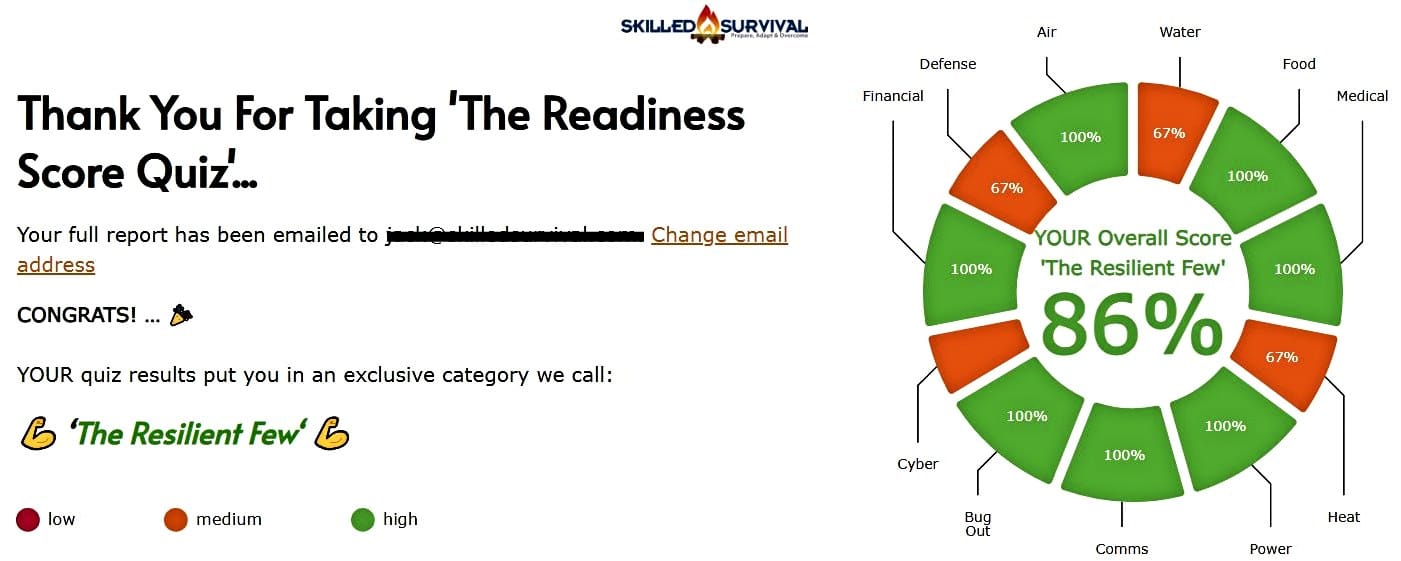
AND... I've still got a few gaps in my preps...🤔 But at least, I'm not part of 'The Fragile Masses'. 👍 Find out where YOU stand by answering a few questions...
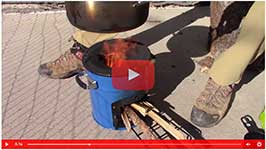
Recommended Reading
LifeStraw Review: An Expert Puts It To The Ultimate Test
LifeStraw Review - with no moving parts, chemical additions, or batteries, it provides a lightweight, compact filter to treat up to 4000L...
Best Survival Bow: 16 Surprising Reasons YOU Should Get One
A survival bow is one of the most underappreciated weapons I think EVERYONE should own. Here are 16 reasons why YOU should get one today.
Best Survival Hatchets: Tough Enough To Outlast The Wild
Not all hatchets are created equal. A quality survival hatchet can do tasks even a survival knife cannot. Here's the one I carry in my pack.
Best EDC Flashlight: Simple, Small, Compact & Super Bright
The best edc flashlight is durable, bright, compact and worth carrying! In this guide, we review the best one to make your search easy.
11 Proven DIY Survival Gear Projects ANYONE Can Follow
Building DIY survival gear doesn't NEED to be complicated to be effective. Here are the 11 best projects you can finish in just a few hours.
Is Tap Water Safe To Drink? The Truth Behind The Lies
Is your tap water really safe to drink? This guide provides a definite answers and a simple solution you can implement immediately.




